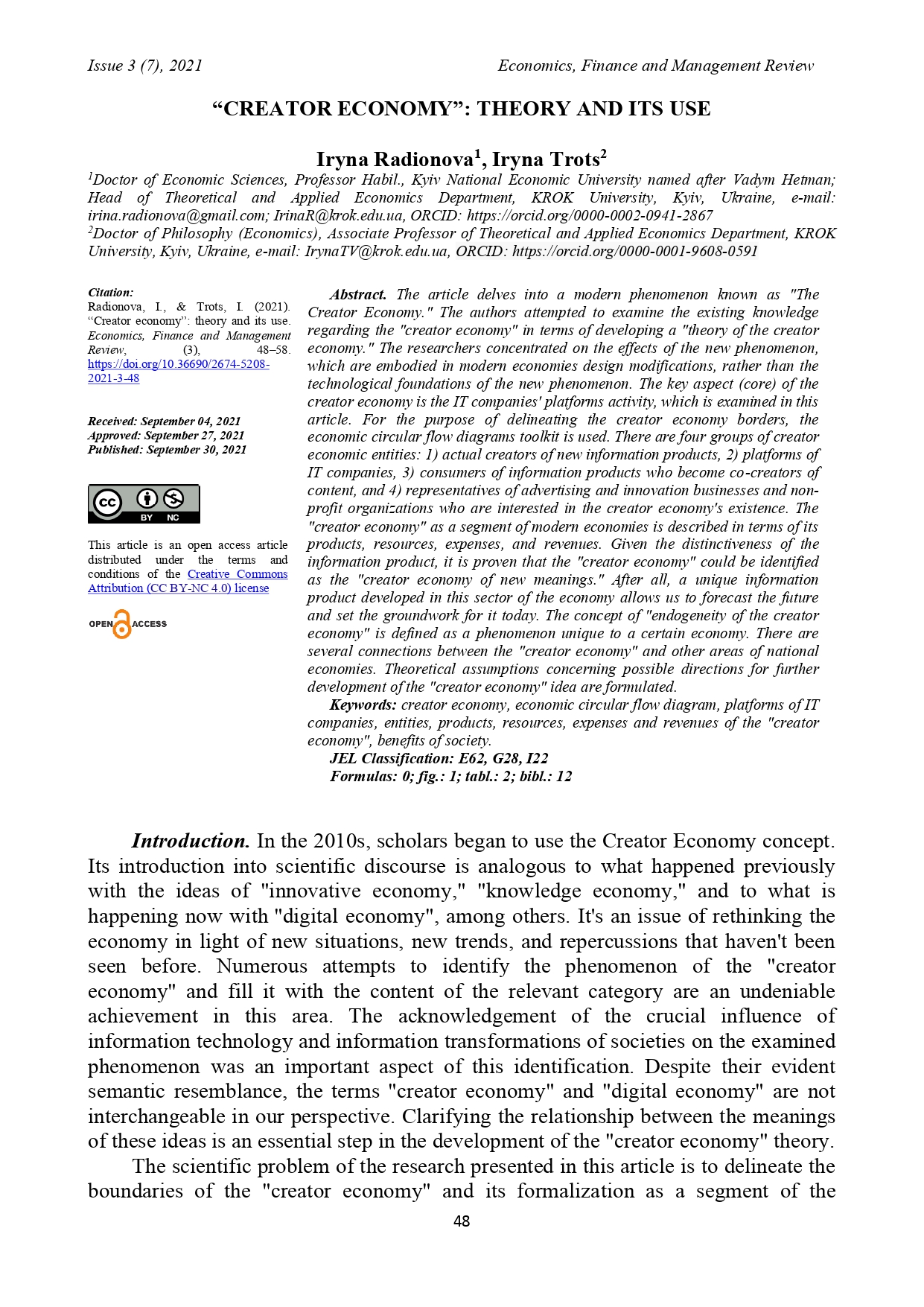“CREATOR ECONOMY”: THEORY AND ITS USE
DOI:
https://doi.org/10.36690/2674-5208-2021-3-48Keywords:
creator economy, economic circular flow diagram, platforms of IT companies, entities, products, resources, expenses and revenues of the , benefits of societyAbstract
The article delves into a modern phenomenon known as "The Creator Economy." The authors attempted to examine the existing knowledge regarding the "creator economy" in terms of developing a "theory of the creator economy." The researchers concentrated on the effects of the new phenomenon, which are embodied in modern economies design modifications, rather than the technological foundations of the new phenomenon. The key aspect (core) of the creator economy is the IT companies' platforms activity, which is examined in this article. For the purpose of delineating the creator economy borders, the economic circular flow diagrams toolkit is used. There are four groups of creator economic entities: 1) actual creators of new information products, 2) platforms of IT companies, 3) consumers of information products who become co-creators of content, and 4) representatives of advertising and innovation businesses and non-profit organizations who are interested in the creator economy's existence. The "creator economy" as a segment of modern economies is described in terms of its products, resources, expenses, and revenues. Given the distinctiveness of the information product, it is proven that the "creator economy" could be identified as the "creator economy of new meanings." After all, a unique information product developed in this sector of the economy allows us to forecast the future and set the groundwork for it today. The concept of "endogeneity of the creator economy" is defined as a phenomenon unique to a certain economy. There are several connections between the "creator economy" and other areas of national economies. Theoretical assumptions concerning possible directions for further development of the "creator economy" idea are formulated.
Downloads
References
Saffo P. (2020). The Creator Economy. Seminars About Long-term Thinking / A monthly Seminar series, hosted by Stewart Brand. Retrieved from: https://longnow.org/seminars/02015/mar/31/creator-economy/
Greenwald T. The Creator Economy: Futurist Paul Saffo On The New Business Epoch (2011). Retrieved from: https://www.forbes.com/sites/tedgreenwald/2011/10/19/the-creator-economy-futurist-paul-saffo-on-the-new-business-epoch/?sh=6e6cd3bf61c1#:~:text=The%20Creator%20Economy%3A%20Futurist%20Paul%20Saffo%20On%20The%20New%20Business%20Epoch
Saffo P. (2016). Get ready for a new economic era. Retrieved from: http://www.saffo.com/wp-content/uploads/2016/06/McKinsey-Creator.pdf
Geyser W. (2021). The State of the Creator Economy (2021) | Definition, Growth & Market Size. Retrieved from: https://influencermarketinghub.com/state-of-the-creator-economy/
Forsyth O. (2021). The Creator Economy boom: What it is, what's driving it, and trends you need to know. Retrieved from: https://www.antler.co/blog/the-creator-economy-boom-what-it-is-whats-driving
Bergendorff С.L. (2021). From The Attention Economy To The Creator Economy: A Paradigm Shift. Retrieved from: https://www.forbes.com/sites/claralindhbergendorff/2021/03/12/from-the-attention-economy-to-the-creator-economy-a-paradigm-shift/
Liashenko V.I., & Vyshnevskyi O.S. (2018). Digital modernization of Ukraine's economy as an opportunity for breakthrough development: a monograph. NAS of Ukraine, Inst. Of Industrial Economics. Kyiv, 2018. 252 p. Access mode: https://iie.org.ua/wp-content/uploads/monografiyi/2017/Lyashenko_Vishnevsky_2018.pdf
Kateryniak I. (2021). Innovation Spring in Tech Startup: momentum to take off = “Інноваційна весна” в технологічних стартапах: моментум для злету : textbook / Ihor Kateryniak. – Lviv: LNU named after Ivan Franko, 2021. – 172 p.
Pyshchulina O. (2020). Digital economy: trends, risks and social determinants. Access mode: https://razumkov.org.ua/uploads/article/2020_digitalization.pdf
Shymanska K.V. & Bondarchuk V.V. (2021). Priority directions and mechanisms of digital economy development in Ukraine. Economics, management and administration, №1(95), 17–22. https://doi.org/10.26642/ema-2021-1(95)-17-22. Режим доступу: http://ema.ztu.edu.ua/article/view/228957
Arthur Eli Monroe. (1923). Early Economic Thought. Cambridge. pp. 336-348.
Samuelson P. (1948). Economics: The Original 1948 Edition: 1st (first) Edition Tapa dura – 1 December 1998. Economics, an Introductory Analysis, Paul A. Samuelson. (New York: McGraw-Hill Company, 1948.). pp. 622.

Downloads
Published
How to Cite
Issue
Section
License

This work is licensed under a Creative Commons Attribution-NonCommercial 4.0 International License.








